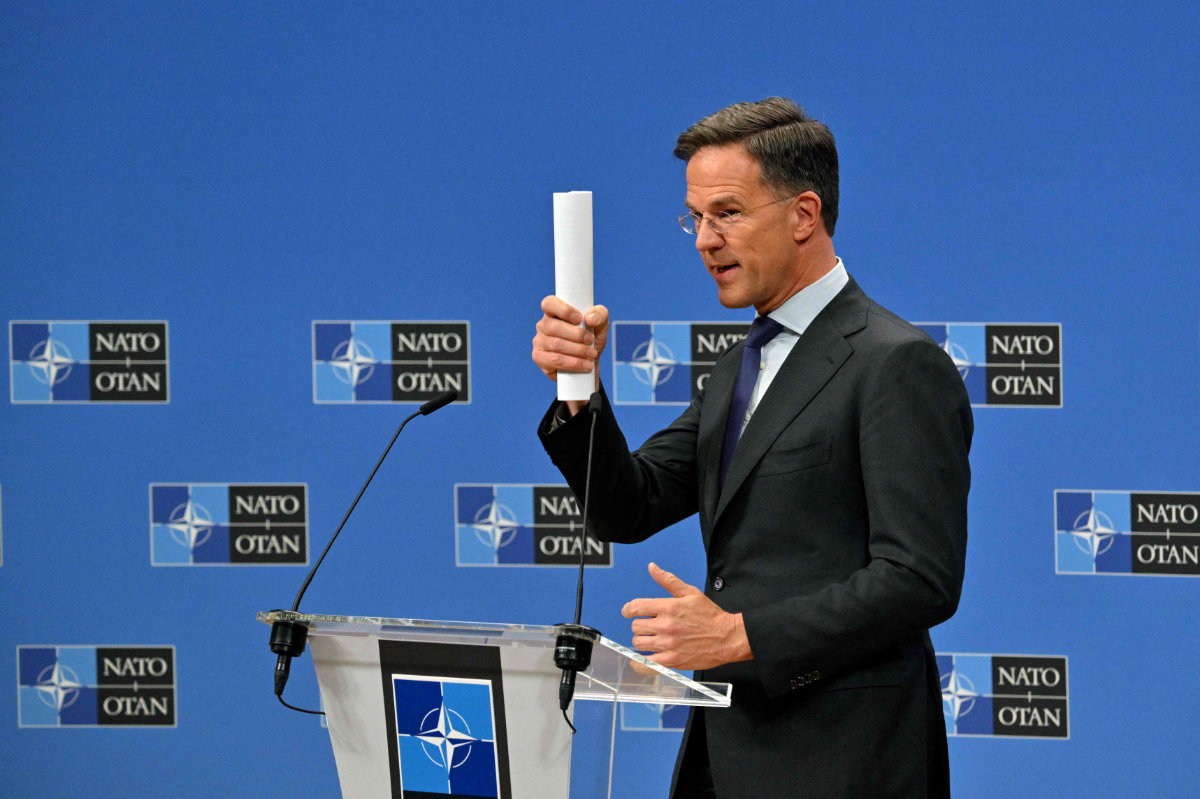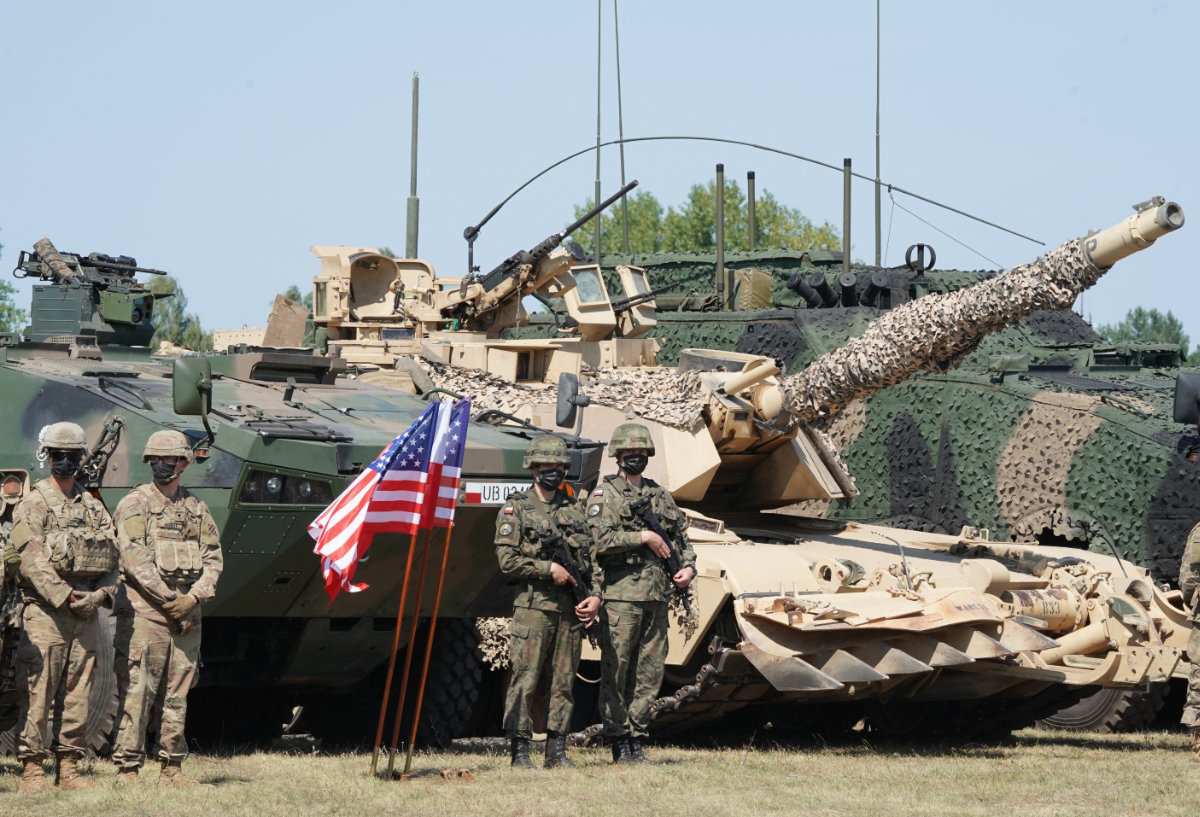WASHINGTON: US Secretary of State Marco Rubio travels this week to a gathering of top diplomats from NATO countries and is sure to find allies that are alarmed, angered and confused by the Trump administration’s desire to reestablish ties with Russia and its escalating rhetorical attacks on longtime transatlantic partners.
Allies are deeply concerned by President Donald Trump’s readiness to draw closer to Russian leader Vladimir Putin, who sees NATO as a threat, amid a US effort to broker a ceasefire in Ukraine. Recent White House comments and insults directed at NATO allies Canada and Denmark — as well as the military alliance itself — have only increased the angst, especially as new US tariffs are taking effect against friends and foes alike.

NATO Secretary-General Mark Rutte gestures as he delivers a press conference at the NATO headquarters in Brussels on April 2, 2025, on the eve of a Ministerial Foreign affairs meeting. (AFP)
Rubio arrives in Brussels on Thursday for two days of meetings with his NATO counterparts and European officials, and he can expect to be confronted with questions about the future US role in the alliance. With him on the trip will be newly confirmed US ambassador to NATO Matt Whitaker.
For 75 years, NATO has been anchored on American leadership, and based on what they have seen and heard since Trump took office in January, European officials have expressed deep concerns that Trump may upend all of that when he and other NATO leaders meet for a June summit in the Netherlands.
Can Rubio reassure allies?
As Rubio did last month at a meeting of foreign ministers from the Group of 7 industrialized democracies, America’s top diplomat, who is regarded by many overseas as a more pragmatic and less dogmatic member of Trump’s administration, may be able to salvage a watered-down group consensus on the war in Ukraine.
That’s even as Trump said this week that Ukraine “was never going to be a member of NATO” despite leaders declaring at last year’s summit that the country was on an “irreversible” path to join.
But Rubio will be hard-pressed to explain Washington’s unprovoked verbal attacks on NATO allies Canada, which Trump says he wants to claim as the 51st state, and Denmark, whose territory of Greenland he says the US should annex. Both have been accused of being “bad allies” by Trump and Vice President JD Vance.
“It’s pretty clear neither territory has any interest in joining a Trumpian America,” said Ian Kelly, US ambassador to Georgia during the Obama and first Trump administrations and now an international studies professor at Northwestern University in Evanston, Illinois.
“There’s going to be a lot of very anxious Euros about what Trump is going to call for and what announcements he’s going to make,” he said. “If he isn’t already, Rubio is going to be in a mode of trying to reassure European allies that we are not, in fact, not dependable.”

US Secretary of State Marco Rubio boards his plane at Joint Base Andrews, Maryland, on April 2, 2025, en route to NATO in Belgium. (Pool via REUTERS)
Yet, in just under two months, NATO has been shaken to its core, challenged increasingly by Russia and the biggest land war in Europe since 1945 from the outside, and by the Trump administration from within, breaking with decades of relatively predictable US leadership.
Trump has consistently complained about NATO members’ defense spending and even raised doubts about the US commitment to mutual defense in the alliance’s founding treaty, which says an attack on one NATO member is considered an attack on all.

Europeans taking on more security guarantees
Since Defense Secretary Pete Hegseth warned last month that US security priorities lie elsewhere — in Asia and on its own borders — the Europeans have waited to learn how big a military drawdown in Europe could be and how fast it may happen.
In Europe and Canada, governments are working on “burden shifting” plans to take over more of the load, while trying to ensure that no security vacuum is created if US troops and equipment are withdrawn from the continent.
These allies are keen to hear from Rubio what the Trump administration’s intentions are and hope to secure some kind of roadmap that lays out what will happen next and when, so they can synchronize planning and use European forces to plug any gaps.
At the same time, NATO’s deterrent effect against an adversary like Russia is only credible when backed by US firepower. For the Europeans and Canada, this means that US nuclear weapons and the 6th Fleet must remain stationed in Europe.
“America is indispensable for credible deterrence,” a senior NATO diplomat told reporters on condition of anonymity to speak ahead of the meeting.

Polish and US troops take part in the so-called Defender-Europe 20 joint military exercise at Drawsko Pomorskie training grounds in Poland on August 11, 2020. (AFP)
Around 100,000 US troops are deployed across the continent. European allies believe at least 20,000 personnel sent by the Biden administration after Russia launched its full-scale invasion of Ukraine three years ago could be withdrawn.
Another priority for US allies is to understand whether Trump believes that Russia still poses the greatest security threat. In their summit statement last year, NATO leaders insisted that “Russia remains the most significant and direct threat to Allies’ security.”
But Trump’s receptiveness to Putin and recent favorable remarks by some US officials have raised doubts. The question, diplomats say, is why allies should spend 5 percent of their gross domestic product on their defense budgets if Russia is no longer a threat.
At the same time, the Europeans and Canada know they must spend more — not least to protect themselves and keep arming Ukraine. At their next summit in June, NATO leaders are expected to raise the alliance’s military budget goal from at least 2 percent to more than 3 percent.
Rubio “is in a very difficult position,” said Jeff Rathke, president of the American-German Institute at Johns Hopkins University. Trump “has tried to convince allies that a US realignment with Russia is in the best interests of the US and presumably Europe, and at the same time tell them that they need to double their defense spending to deal with threats posed by Russia,” he said. “The logical question they will ask is ‘why?’”




























